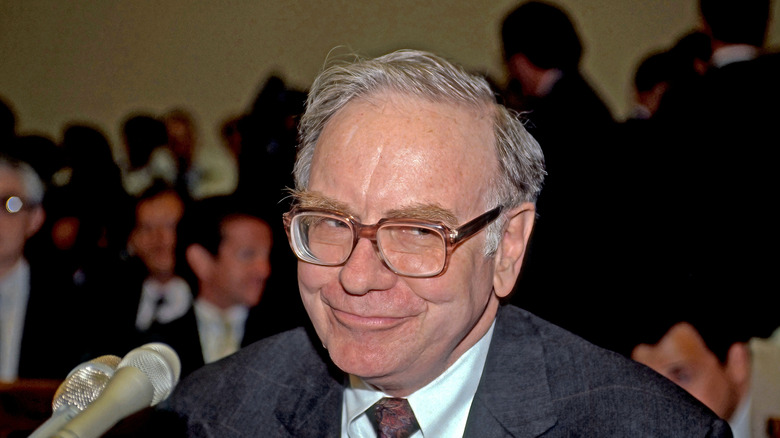The Profitable Stock Warren Buffet Hasn't Touched In 27 Years Might Have A Few Red Flags
Berkshire Hathaway has a penchant for deploying its intellectual head's buy-and-hold strategy. Warren Buffet is famously a long-hold trader who seeks to capitalize on trending value over sometimes glacially slow study periods. He's a consummate value seeker who always looks to gain a deeper understanding of the market before making any move — whether that be a purchase or an exit from his positions. Buffet's example is one that many traders can learn a lot from. He's one of the richest Americans alive (Forbes pegs him as the 6th richest in the world as of early March 2025), and built his fortune as an investor. He's followed one particular guiding star for much of this time, investing in undervalued brands and dumping shares when his analysis points to a changeover in this marketplace positioning.
It's perhaps telling that Buffet and Berkshire Hathaway have dumped nearly 1 billion total shares of major companies recently. Both Apple and Bank of America have been on Buffet's hit list, but one company has remained unfazed by Berkshire Hathaway's recent capital liquidation efforts. Purchased for the first time in 1991 and then consolidated with additional accumulation in 1998, Berkshire Hathaway's position in American Express has remained unchanged (at roughly 151.6 million shares) since the company performed a stock split in 2000. While it may be a fool's errand to try to burrow into the mind of the Oracle of Omaha, exploring his tendencies and trading pattern may illuminate some elements of his thinking, while also uncovering other features of the Amex brand and its stock.
Buffet targets brands that effectively build financial 'moats'
As an investor, Warren Buffet has frequently shown a significant affinity for companies that feature solid revenue diversification. It's worth noting that diversification is an important part of most financial strategies, whether it be business revenue generation or in building a blended and robust investment portfolio. However, when it comes to spreading assets, focus, and more, too much of a good thing can actually become a hindrance. In the business arena, good diversification and long-range financial stability is frequently referred to as a moat, suggesting a defensive fortification of the business' capability to continue performing long into the future.
In the case of American Express, Buffet appears to have found a consummate winner. In the early 1990s, when Buffet began taking up positions in the company, it was trading at a split-adjusted price of roughly $10 per share. Today, AXP is valued at roughly $275 and its trend line has delivered consistent upward movement throughout almost the entirety of that time (aside from negative momentum during market downturns like the economic meltdown of 2007). One of the most important facets of American Express' business model lies in the fact that it both issues credit accounts to consumers and stands as one of the four primary global credit card networks. Revenue therefore comes from both ends of consumer spending, unlike companies like Visa or Mastercard.
American Express is a relatively strong 'buy' but is trading near all time highs
Investment analysts give American Express a fairly strong "buy" rating with 37 bullish on the stock, 22 offering "hold" verdicts, and 13 suggesting it's a "sell," according to data from Business Insider. It's undeniable that the business model is a strong one, and long term performance has produced a very compelling trend line. Revenue was up 6% in 2024 and earnings per share figures rose 25% during this time, as well. Many of the fundamentals of the company indicate a healthy present and continued strong performance. But there's far more to stock market pricing than just market fundamentals. The reality is far murkier.
For one thing, it's worth noting that Warren Buffet hasn't added to his position in American Express for nearly three decades. That suggests that the company is a "hold" in his mind. While strong financial performance and company fundamentals continue to send AXP shares rising, that doesn't mean that the trend can hold on forever. Buffet is also a well-known contrarian investor. If a major sell-off sends a company's share price tumbling, Buffet will frequently look to understand why and potentially capitalize on the precipitous fall ahead of a realignment that sees share price return to greener pastures. In the case of American Express, the stock is trading near its all-time high-water mark. Even though its P/E ratio stands at roughly 20 (indicating a generally fair market value in terms of earnings), continued growth can't sustain itself forever and buying a stock when it's nearing this territory can and sometimes does spell disaster for buyers who are late to the party.


